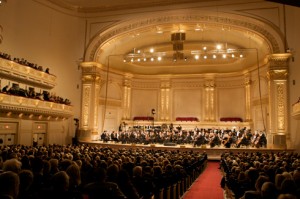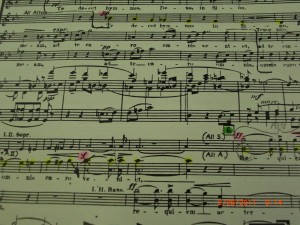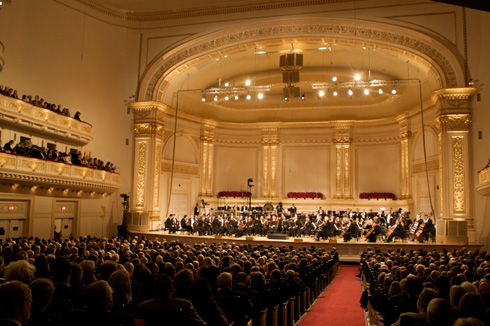 Although it has been just over a week since Capital Pride returned home, I don’t think the experience of performing at Carnegie Hall has really hit me yet, or if it ever will. It all began with an announcement: Capital Pride was going to New York! At first, I was just excited that we were going to the Big Apple (Shopping!) and that I would get a nice little vacation from Leesville (No homework!). Then, after receiving the spiral-bound Berlioz Requiem score, I knew I wasn’t ready. The Berlioz Requiem, on paper, looks like something your printer spits out when your computer has a virus. It is a convoluted masterpiece of musical symbols, numbers, and Latin splattered upon one-hundred sheets of paper. As grotesque as I’ve made the Requiem sound, it was anything but disgusting when we heard a sample of the Atlanta Symphony Orchestra performing the piece. The music was beautiful, brilliant, and absolutely—insane.
Although it has been just over a week since Capital Pride returned home, I don’t think the experience of performing at Carnegie Hall has really hit me yet, or if it ever will. It all began with an announcement: Capital Pride was going to New York! At first, I was just excited that we were going to the Big Apple (Shopping!) and that I would get a nice little vacation from Leesville (No homework!). Then, after receiving the spiral-bound Berlioz Requiem score, I knew I wasn’t ready. The Berlioz Requiem, on paper, looks like something your printer spits out when your computer has a virus. It is a convoluted masterpiece of musical symbols, numbers, and Latin splattered upon one-hundred sheets of paper. As grotesque as I’ve made the Requiem sound, it was anything but disgusting when we heard a sample of the Atlanta Symphony Orchestra performing the piece. The music was beautiful, brilliant, and absolutely—insane.
Now, I should elaborate on insanity of the whole idea. Mrs. Covington had suggested a lot of crazy things in the past, but I was positive that she had completely lost it. The Berlioz Requiem is just not something that high school kids attempt to understand. I certainly could not fathom performing such a ridiculous piece of music with members of the Atlanta Symphony Orchestra Chorus. In fact, I could barely think of a college chorale that would attempt such a feat.
Although learning the piece seemed impossible, we worked on the Requiem every class period. We rehearsed so much that I dreaded the class period every day. Sight-reading and jumping around from note-to-note was not my idea of a fun time in chorus. Capital Pride was supposed to be a time for relaxation, where I could let go of my “outside problems”. Music for me used to be cathartic, but instead it became a stressful nuisance that made me ill with frustration. I never seemed to get the notes right, and when I finally figured out a difficult measure of music, there was always something else that needed to be corrected. Although I desperately wanted to quit the Berlioz project, I kept working at it (mostly because there were forty-four other people suffering with me).
When Norman McKenzie, our Carnegie Hall music director came to visit, all of our rehearsing was worth it. He never thought that we would be so prepared because of our age, and our six-hour-long rehearsal flew by with ease. Mr. McKenzie explained how each movement fit together and the absolute genius that flooded each page of music. He taught us to “love each note” and that every note had a purpose. Personifying music theory gave the Requiem more depth and more character. It was after that particular rehearsal that I began approaching the piece with purpose. I fell in love with the music all over again. After changing my mindset, each class period became progressively shorter until it was finally time to go to New York.
The rehearsals in New York were probably more memorable than the performance itself. When we rehearsed with the adult choirs, the cacophony of volume and depth of sound was indescribable. I had never been a part of something so magnificent, and the experienced professional singers treated us like adults. We weren’t just the high-schoolers they had to “put up with”—we were their colleagues.
Before our big debut, Capital Pride received the opportunity of touring Carnegie Hall. Our tour guide was an older woman, about seventy to eighty years of age. She had given these tours several times and walking us through the building and the history of the Hall was a casual routine for her. As she showed us around the building, the historical spirit of Carnegie Hall was almost dream-like in its presentation, and no one spoke a word.
I have never been the kind of person that is emotionally moved by a visual piece of art. In fact, I have found it rather amusing that anyone could possibly have any emotional connection so something still and non-breathing. After entering the Stern Auditorium in Carnegie Hall, I have changed my mind. I took one step inside and began to cry. I had never seen anything more beautiful in my life, and the numerous postcards I brought home will never do it justice. The “CP to NY” fantasy became a reality at that point, and I was overwhelmed with pride—my choir was singing at Carnegie Hall, and I was performing on that stage.
The actual performance is a blur to me. I thought that I would be terrified, singing in a sold out performance, but I felt a strange emptiness while singing. The experience of performing on the Stern Auditorium stage was the most powerful experience of my life because its lasting impression is still numbing. I cannot begin to describe how I felt while singing because it was on that stage that I became truly part of the music. I wasn’t a person performing, but rather, an instrument producing music. It wasn’t until our standing ovation that I even realized what I was doing.
Coming home after such an incredible opportunity is difficult because I feel somewhat incomplete musically. After so much work and dedication to such a difficult piece, the reward of performing the Requiem was brief and bitter-sweet. I miss rehearsing and living within the music, and I know that I have grown as a musician and most of all, as a person. The hardest transition will probably be switching from singing classical music to African-American spirituals for our spring concert—I’m crossing my fingers.

I am very impressed with the level of writing in this piece as well as the intense emotion you experienced during your preparation and execution of your performance. It is so much easier to write about something you are so passionate about, isn’t it?